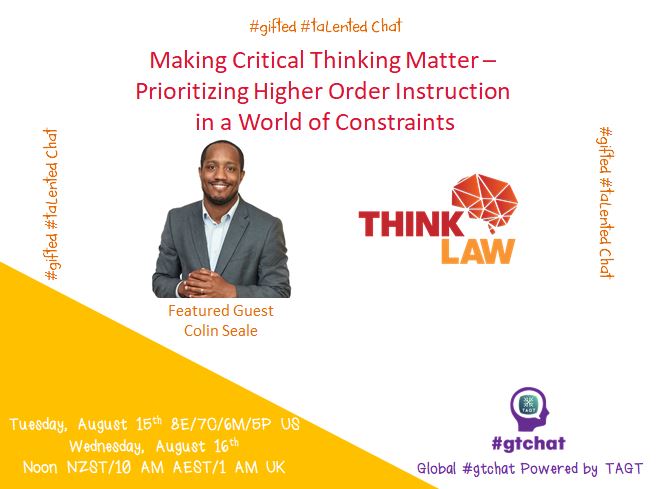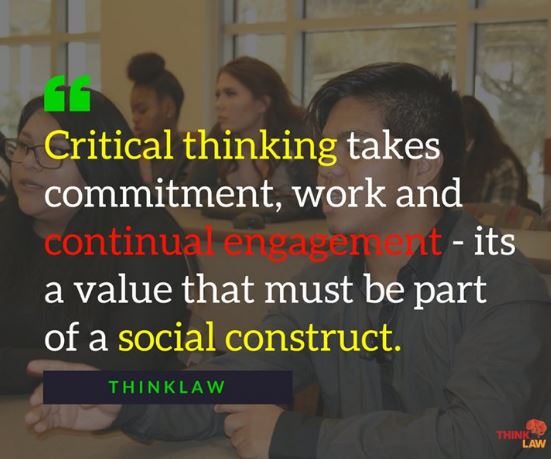
This week on Global #gtchat Powered by TAGT our featured guest was Colin Seale, Esq. Colin is the Founder and CEO of thinkLaw, which helps educators teach critical thinking to all students through an award-winning, standards-aligned supplemental curriculum based on real-life legal cases and powerful & personalized professional development that helps educators apply critical thinking across grade levels and subject areas. thinkLaw partners with over 60 schools in 11 states as part of its revolutionary agenda to create a world where critical thinking is no longer a luxury good.
Colin and his team provided excellent information on the importance of teaching critical thinking in schools. Critical thinking is considered one of the most important 21st century skills. The days of viewing education as an information delivery service are gone. Students need to learn critical thinking as it is viewed as a ‘life skill’ necessary for success today.
“We are preparing students for entire industries that do not exist yet. Critical thinking cannot be a luxury good! It is the precursor to innovation. STEAM means zip if students can’t find, communicate, and solve real problems.” ~ Colin Seale, Esq.
Innovative educators are realizing that learning ‘how to think’ trumps content every time. The world’s best education systems know that engaging students’ passions can tip the scales for learning. Colin explained, “[There has been a] paradigm shift: content vs. depth is a false choice. Start with powerful questions and motivate content acquisition.”
Why is it so hard to get today’s K-12 students to think deeply? K-12 students’ brains have been numbed by endless test prep and testing. Smart educators are just saying ‘NO’! Many students must endure hours, semesters, or even years of sitting in classes being required to relearn what they already know. Students think deeply about what they are passionate about. It’s time to tap into those passions! As Colin told us, “We rarely encourage risk-taking and too often punish mistakes. Freedom to fail = Freedom to think.”
Engineers tend to struggle analyzing poetry. We need to make critical thinking transferable across subject areas. From the earliest years in school, cross-curricular teaching strategies can achieve a valuable liberal arts education. ‘Critical thinking’ should never rely on a single approach or methodology. Creative teaching is essential. Regarding professional development , Colin said, “it must be personalized and practical so teachers can apply it immediately. Otherwise, it’s just eye candy. Creativity, communication and collaboration must be embedded within all critical thinking activities.”

Content knowledge is much easier to assess than critical thinking skills. Colin suggests, “Just like GT testing, critical thinking assessment is best when it’s authentic and varied. Tie it to meaningful activities!” It should cover problem interpretation, inference, analysis explanation and evaluation skills. Critical thinking assessment tools take time to produce; worksheets and standardized testing need to be replaced.
“The crux of critical thinking assessment is students supporting their thinking with sound reasoning.” ~ Sarah Pfeiler, thinkLaw Team
Finally, we discussed practical methods and tools teachers can use to focus on critical thinking more regularly. Early on, teachers need to impress on students that there can be multiple solutions to problems; seek the best. Even very young students can be taught introspective skills; how does ‘what I know or believe’ affect decisions. Colin added, “Students who care about the problems they solve will persevere through the problem-solving process!” A transcript of this chat may be found at Storify.


Global #gtchat Powered by the Texas Association for the Gifted and Talented is a weekly chat on Twitter. Join us Tuesdays at 8E/7C/6M/5P in the U.S. and Wednesdays at Noon NZST/10 AM AEST/1 AM UK to discuss current topics in the gifted community and meet experts in the field. Transcripts of our weekly chats can be found at Storify. Our Facebook Page provides information on the chat and news & information regarding the gifted community. Also, checkout our Pinterest Page and Playlist on YouTube.
 About the author: Lisa Conrad is the Moderator of Global #gtchat Powered by TAGT and Social Media Manager of the Global #gtchat Community. She is a longtime advocate for gifted children and also blogs at Gifted Parenting Support. Lisa can be contacted at: gtchatmod@gmail.com
About the author: Lisa Conrad is the Moderator of Global #gtchat Powered by TAGT and Social Media Manager of the Global #gtchat Community. She is a longtime advocate for gifted children and also blogs at Gifted Parenting Support. Lisa can be contacted at: gtchatmod@gmail.com
Links:
Free Sample Lesson Download for #gtchat Participants
thinkLaw (Twitter)
thinkLaw (Facebook)
Silence is Not an Option: The Educators’ Call to Action #Charlottesville
6 Critical Thinking Questions for Any Situation
3 Tips for Helping All Students Become 21st Century Communicators
Critical Thinking Should Not Be a Luxury: 3 Strategies for Unleashing the Potential of Every Student
Three Tools for Teaching Critical Thinking and Problem Solving Skills
5 Questions Principals Should Ask to Assess Critical Thinking Instruction in Teacher Observations
3 Strategies for Increasing Student Voice in Your Classroom
Thinking Like a Lawyer: Powerful Strategies to Teach Critical Thinking to All Students (webinar)
Cybraryman’s Questioning Techniques Page
Cybraryman’s Critical Thinking Page
FlexFridays Take Learning Beyond the Classroom
Photo and logo courtesy of ThinkLaw.
Graphic courtesy of Lisa Conrad.